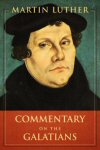The Martin Luther Collection (42 vols.)
Digital Logos Edition
Overview
Focused on the teaching of the Bible, the writings of Martin Luther represent a massive corpus of biblical interpretation and theological articulation. Luther's work was the first attempt to use a critical edition of the New Testament in order to provide exegetical support for Christian doctrine. His writings transformed Christianity and helped usher in the modern world. With this collection, you'll get dozens of Luther's most important titles including commentaries on Scripture and key theological treatises.
Looking for more from Luther? Check out The Letters of Martin Luther (5 vols.).

- Provides dozens of Luther's key works
- Includes Luther's treatise on Christian Freedom
- Features Luther's pastoral Table Talk
- Title: The Martin Luther Collection
- Authors: Martin Luther, T. Stork
- Volumes: 42
- Pages: 13,068
- Christian Group: Lutheran
Individual Titles
- The Precious and Sacred Writings of Martin Luther (14 vols.) by Martin Luther
- Luther's Small and Large Catechism with Select Commentary (6 vols.) by Martin Luther
- Select Life and Works of Martin Luther (4 vols.) by Martin Luther
- Selections from Luther's Table Talk (4 vols.) by Martin Luther
- Works of Martin Luther with Introductions and Notes (2 vols.) by Martin Luther
- Martin Luther Devotional Collection (2 vols.) by Martin Luther
- Henry Cole's Select Works of Martin Luther (2 vols.) by Martin Luther
- Luther's Commentary on Galatians by Martin Luther
- Commentary on the Sermon on the Mount by Martin Luther
- Sermons on the Passion of the Christ by Martin Luther
- Sermons on the Most Interesting Doctrines of the Gospel by Martin Luther
- A Selection of the Most Celebrated Sermons of Martin Luther by Martin Luther
- Luther and the Bible by T. Stork
- Luther at Home by T. Stork
- Luther's Christmas Tree by Martin Luther
This title is included in the following collections
You can save when you purchase this product as part of a collection.
Logos 8 Lutheran Gold Legacy L...
$849.99$849.99Logos 7 Lutheran Gold Legacy L...
$849.99$849.99Logos 9 Lutheran Gold Legacy L...
$849.99$849.99Logos 8 Lutheran Platinum Lega...
$1,499.99$1,499.99
- $1,499.99
- $1,499.99
- $2,999.99$2,249.99
- $2,999.99
- $2,999.99
- $2,999.99
- $4,749.99$3,562.49
- $4,749.99
- $4,749.99
- $4,749.99
- $23,999.99$17,999.99
- $21,749.99
- $24,999.99

Study some of Martin Luther’s most treasured works with this collection. John Nichaolas Lenker presents the largest systematic translation of his time of Luther’s works into English. Luther’s sermons on the Gospels and the Epistles are pinned to the liturgical year, and both his large and small catechisms—as well as his own commentary on them—are included. In addition, Lenker includes Luther’s commentaries on the Psalms and Genesis, his sermons on the Epistles, and his church postils. Please note: this product will download as 13 digital resources but is 14 volumes in print.
Martin Luther (1483–1546) was a key figure in the Protestant Reformation and one of the most significant figures in Western history. Over the course of his life, he was a monk, a priest, a professor of biblical literature, a Reformer, a husband, and a father.
John Nicholas Lenker (1858–1929) was baptized as a Presbyterian, but after attending a Lutheran Sunday School and Bible study, he united with the Lutheran Church. He attended the Missionary Institute at Selinsgrove and then graduated from Wittenberg College and Wittenberg Theological Seminary. In 1880, he was ordained to ministry and served as the president of the American Lutheran Immigrant Missionary Society. He started two Lutheran congregations in Grand Island, Nebraska, and served as pastor for one of them, St. Paul’s English Lutheran.
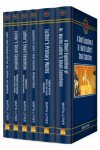
It is difficult to estimate the influence of Martin Luther upon Christian theology and the practices of the church. In this collection, you can study the theology that ignited the Reformation and led to the establishment of the Lutheran church, still prominent today with approximately 80 million adherents worldwide. Martin Luther’s small and large catechisms are included along with commentary, exposition, hymns, chants, and Bible verses for memorization. The commentary and exposition provides deeper insight into the Lutheran perspective of basic tenets of the evangelical faith. Some of Martin Luther’s most significant writings are included in this collection along with explanatory articles and supplemental material. Enrich your library with the writings of one of the major leaders of the Protestant Reformation.
Martin Luther (1483–1546) was a key figure in the Protestant Reformation and one of the most significant figures in Western history. Over the course of his life, he was a monk, a priest, a professor of biblical literature, a Reformer, a husband, and a father.

Martin Luther was one of the clearest voices of the Reformation, known for calling Christians to live biblically. His influence on Christendom is incalculable. Since the sixteenth century, his hymns, sermons, and writings have helped generations to understand and apply the Scriptures. This collection includes several compilations of Luther’s hymns, several collections of his sermons, and a historically important translation of On the Bondage of the Will containing translator’s notes.
These records of Luther’s thought and pastoral ministry are an interesting and illuminating glimpse into the application of his doctrinal beliefs in a congregational setting. Both the poetry and the sermon text are clearly written to direct the worshiper’s heart and mind to Christ. Deepen the effectiveness of your own ministry with these historically important records.
Martin Luther (1483–1546) was a key figure in the Protestant Reformation and one of the most significant figures in Western history. Over the course of his life, he was a monk, a priest, a professor of biblical literature, a Reformer, a husband, and a father.
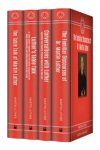
Get to know the man behind the Protestant Reformation with Selections from Luther’s Table Talk. Interested in more than Luther’s serious theological views, sixteenth-century Lutheran Reformer Johannes Mathesius compiled a collection of Martin Luther’s sayings into a volume titled Table Talk. Mathesius’ aim was to give readers the experience of dining and conversing with Martin Luther—quips, facetious remarks, and theological gems combined.
This collection, Selections from Luther’s Table Talk, contains special selections from Mathesius’ original volume, featuring Luther’s catechism, discourses, and intimate conversations—recorded by those who knew him well. Offering an intimate glimpse into the man behind the theology, this collection of his sayings are selected and arranged to make Luther more accessible to the masses.
Martin Luther (1483–1546) was a key figure in the Protestant Reformation and one of the most significant figures in Western history. Over the course of his life, he was a monk, a priest, a professor of biblical literature, a Reformer, a husband, and a father.

In the Works of Martin Luther with Introduction and Notes, Martin Luther’s teachings are given renewed life. This translation provides a selection of treatises that delve into the controversies of Luther’s day. Filled with great insight into the truth of the Scriptures, this collection covers topics ranging from indulgences, the Roman Papacy, the Babylonian captivity, and the Ten Commandments.
Martin Luther (1483–1546) was a key figure in the Protestant Reformation and one of the most significant figures in Western history. Over the course of his life, he was a monk, a priest, a professor of biblical literature, a Reformer, a husband, and a father.
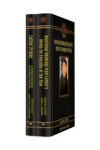
Delve into Martin Luther’s writings and get to know his teachings better with the Martin Luther Devotional Collection. This series includes excerpts from Luther’s writings that were used as Bible studies during the quarter-centenary of the Protestant Reformation. It also contains devotional selections for every day of the year, containing gems of Luther’s teachings that provide insight to believers.
Martin Luther (1483–1546) was a key figure in the Protestant Reformation and one of the most significant figures in Western history. Over the course of his life, he was a monk, a priest, a professor of biblical literature, a Reformer, a husband, and a father.
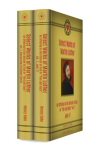
Martin Luther is one of the great giants of church history. By translating the Bible into the vernacular he enabled the common man to examine the Scriptures. Luther was such a prolific writer that few Christians today have read all of his works. Henry Cole’s Select Works of Martin Luther brings together a selection of some of Luther’s most significant writings. This multi-volume set includes sermons and commentary carefully arranged by translator Henry Cole to make Luther’s work more accessible. This collection serves as an introduction to the writings of one of the Reformation’s most influential leaders. Gain exegetical and theological insights for academic research, personal Bible study, or sermon preparation.
Martin Luther (1483–1546) was a key figure in the Protestant Reformation and one of the most significant figures in Western history. Over the course of his life, he was a monk, a priest, a professor of biblical literature, a Reformer, a husband, and a father.
This classic commentary on Galatians enables you to study under the great reformer who not only reveals great scholarship but also an intense personal identification with these profound Pauline truths. Martin Luther avoids unnecessary technicalities, yet he brings to light the depths of Paul's meaning like no other commentator. This is an outstanding, doctrinally-sound, comprehensive commentary. The verse-by-verse exposition offers penetrating insights into Luther's theology. It is also a careful analysis and clear presentation of Paul's doctrine, written for all to understand.
Martin Luther (1483–1546) was a key figure in the Protestant Reformation and one of the most significant figures in Western history. Over the course of his life, he was a monk, a priest, a professor of biblical literature, a Reformer, a husband, and a father.
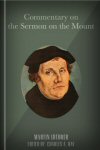
Martin Luther was never shy about calling out what he believed to be the excesses, heresies, and depravity of his tempestuous era. In these sermons on Matthew 5–7, he interprets Jesus’ Sermon on the Mount in light of the theological disputes of his day. Luther’s take on Jesus’ most famous sermon has become one of the most influential approaches in Christian history, emphasizing a strong dichotomy between the Gospel and the Law—a view heavily influenced by his sharp disagreements with the Catholic Church.
Martin Luther (1483–1546) was a key figure in the Protestant Reformation and one of the most significant figures in Western history. Over the course of his life, he was a monk, a priest, a professor of biblical literature, a Reformer, a husband, and a father.
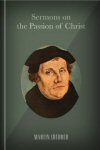
Originally preached during the Easter season, these 13 sermons by Martin Luther detail the arrest, trial, suffering, crucifixion, and resurrection of Jesus. Working through selected passages in the Synoptic Gospels, Luther constructs a vivid passion narrative with his characteristic verve, precision, and spiritual intensity.
Martin Luther (1483–1546) was a key figure in the Protestant Reformation and one of the most significant figures in Western history. Over the course of his life, he was a monk, a priest, a professor of biblical literature, a Reformer, a husband, and a father.
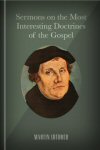
Collecting 34 sermons by legendary Reformer Martin Luther, this volume includes messages on the Nativity, Crucifixion, and Resurrection—as well as practical issues in the Christian life such as prayer, salvation, and the relationship of good works to faith. A thorough primer on Luther and his preaching, Sermons on the Most Interesting Doctrines of the Gospel demonstrates the zeal and devotion that made him such a beloved preacher and theologian.
Martin Luther (1483–1546) was a key figure in the Protestant Reformation and one of the most significant figures in Western history. Over the course of his life, he was a monk, a priest, a professor of biblical literature, a Reformer, a husband, and a father.
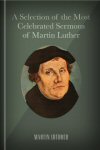
Martin Luther was a tireless preacher, sometimes churning out as many as four sermons in a single day. His prolific preaching ministry was one of the primary ways common people in sixteenth-century Germany absorbed Reformation doctrine. Including an introductory biography of Luther by John Mackenzie, this volume collects sermons that best represent the thought and ministry of this eminent pastor-theologian.
Martin Luther (1483–1546) was a key figure in the Protestant Reformation and one of the most significant figures in Western history. Over the course of his life, he was a monk, a priest, a professor of biblical literature, a Reformer, a husband, and a father.
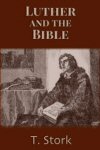
Of the Christian’s relationship to the Bible, Luther said: “The Holy Scriptures require a humble reader who shows reverence and fear toward the Word of God, and constantly says, ‘[t]each me, teach me, teach me’”. It is no secret that Luther loved the Bible, and that his reformation was rooted it a critical-literal method of understanding the Bible’s message. Luther and the Bible explores Luther’s relationship with the Bible from both a scholar-pastor and personal-intimate perspective. Luther scholar Theophilus Stork, who made a career of isolating and explaining key aspects of Luther’s life, provides a welcoming and warm narrative about how Luther loved the Bible and used it to transform Christianity.
Theophilus Stork (1814–1874) is the author of Luther at Home, Luther’s Christmas Tree, Jesus in the Temple, and Children of the New Testament. He and his family were beloved leaders in nineteenth-century American Lutheranism, contributing significantly to the church in ministry and scholarship.
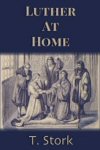
While the early stages of the Reformation focused on doctrinal issues and the abuses of the medieval church, Luther’s ideas also came to influence the social realm. His assertion of the universal priesthood of believers sanctified each person’s labor, and his emphasis on marriage and rejection of the monastery revolutionized the family in early-modern Europe. Luther, of course, married Katherine von Bora who is commonly known today simply as Katie Luther.
Specific anecdotes about Luther's and Katie's home life are few, but sources strongly suggest that the Luther home was vibrant, warm, and exceptionally loving. We know that his household was full of children and that the Luthers’ guests greatly appreciated their unmatched hospitality. Theophilus Stork’s little book, Luther at Home, adds narrative to what we know about Luther’s home life, displaying it as the realized ideal that shaped family life in Protestant households. Providing implicit social commentary in-line with classical Protestantism, this book examines how Luther and Katie lived their theology and in so doing created a home environment that emphasized love, grace, and joy.
Theophilus Stork (1814–1874) is the author of Luther at Home, Luther’s Christmas Tree, Jesus in the Temple, and Children of the New Testament. He and his family were beloved leaders in nineteenth-century American Lutheranism, contributing significantly to the church in ministry and scholarship.
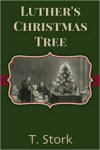
Whether history or legend, the tale of Martin Luther’s Christmas Tree is a heart-warming story about how Luther used Christmas trees to illuminate the way Christ brought God’s light into the world. This exceedingly rare and beloved tale recounts Martin Luther’s life and teaches children about the Christmas heritage purported to derive from Luther. Germany forms the background for many of the West’s perceptions of Christmas and this little book brings them to life with warmth and joy.
Theophilus Stork (1814–1874) is the author of Luther at Home, Luther’s Christmas Tree, Jesus in the Temple, and Children of the New Testament. He and his family were beloved leaders in nineteenth-century American Lutheranism, contributing significantly to the church in ministry and scholarship.
Reviews
2 ratings

John Klinger
10/12/2022

Kevin Bratcher
6/12/2018
